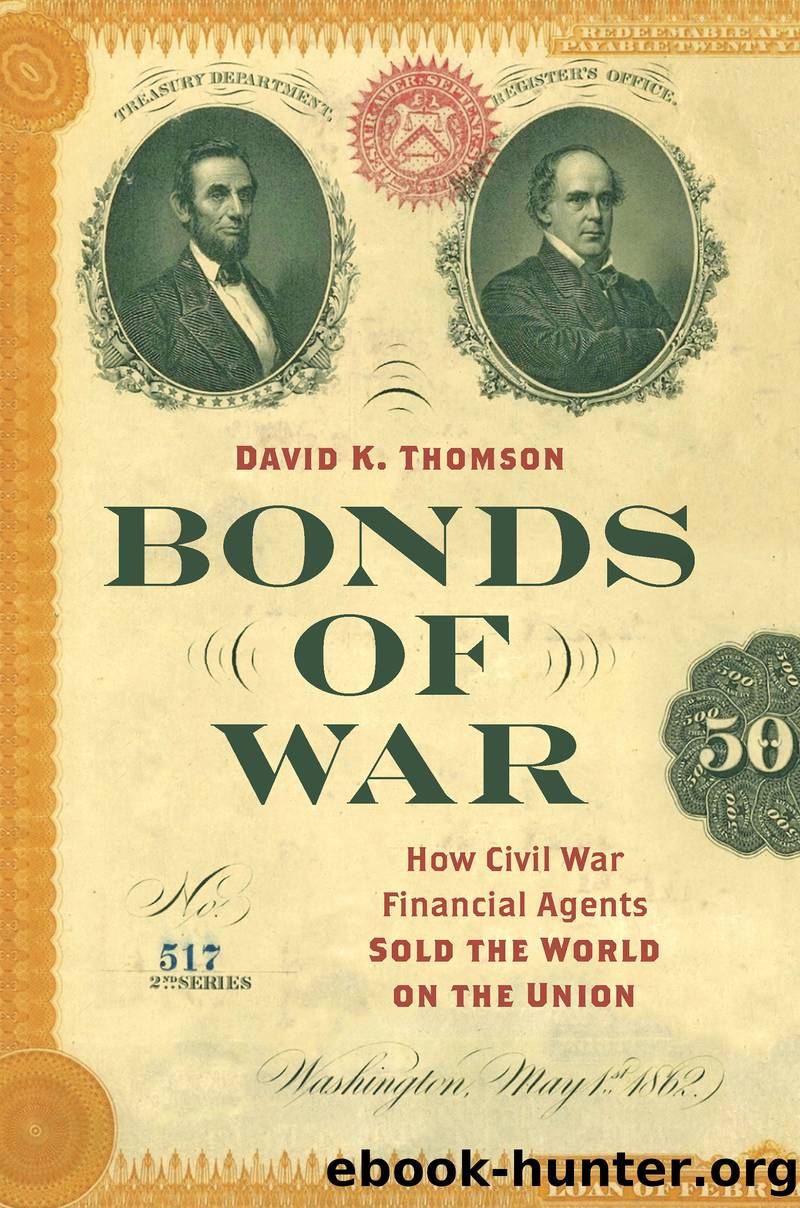Bonds of War by Thomson David K.;

Author:Thomson, David K.;
Language: eng
Format: epub
Publisher: University of North Carolina Press
Other reports, such as that of 3,500 subscriptions on March 15, 1865, out of Portland, Maine, reveal the depth to which the people well and truly bought into the cause of Union and by extension the concept of a true American nation. In undertaking such actions, the American people (largely through Cooke and his network) bought into Cookeâs attempts to sell their confidence in themselves back to themâa task that reaped Cooke and Co. a handsome profit.38
Newspapers cited the effect of bonds to break the will of the Southern people, but also the opportunity such bonds afforded for sectional reconciliation. In keeping with the military-like significance of the bond sales, one newspaper quipped, âThe unexampled success in the disposal of this loan is not without its effect on the rebel mind, giving evidence, as it does, not only of the will of our people to see the war through, but of the money strength of the country to render that will effective.â A week later, another newspaper heralded the wonderful opportunities bond sales could offer in bringing the nation back together again: âThe circle of influences to establish the Seven-Thirty Loan, and to root down deep the credit of the Government on all American territory, disloyal and loyalâto establish it in our armiesâto convert and enlist into the service of the union finances what banks the Rebellion has left alive in the South, and to induce the establishment of new ones under the National Law, where banks ought to existâthis circle is rapidly becoming complete. When finished, the nation will be hooped together with material lines of latitude and longitude, stronger than steel.â Bonds came to be seen as a measure that not only bound the Union together, but also could possibly serve a purpose in bringing the South back into the fold once hostilities ceased.39
Extending the advertisements beyond English-language papers to many immigrant communities also expanded the possible network of investors on the civic margins of society. There was hope that many immigrant communities would invest in the Union cause, and in doing so, make a statement about their own role as future American citizens. The Freie Presse in Philadelphia represented one of several German-language newspapers in the North advertising for the Union. The âSieben-Dreissiger Anleiheâ became well known throughout the German speaking community and âJay Cooke wieder Regierungs-Banquierâ became synonymous with bond sales. While claims would be made incorrectly criticizing the lack of contributions of European financiers, the same would not be said of immigrants to the Union. Once more, these investor acts also played a key role in the larger messaging of the bond drives.40
Economic matters also made their way into houses of God. New England Baptist minister George Ide famously spoke to his congregation about the omnipresence of âthe pillar of Godâs Providence ⦠arranging all, overruling all,â a notion that extended to the world of finance. âHow signal has been the interposition of Providence,â mused Ide, âat the very point in time when the wants
Download
This site does not store any files on its server. We only index and link to content provided by other sites. Please contact the content providers to delete copyright contents if any and email us, we'll remove relevant links or contents immediately.
Zero to IPO: Over $1 Trillion of Actionable Advice from the World's Most Successful Entrepreneurs by Frederic Kerrest(4064)
Machine Learning at Scale with H2O by Gregory Keys | David Whiting(3640)
Harry Potter and the Goblet Of Fire by J.K. Rowling(3612)
Never by Ken Follett(3533)
Ogilvy on Advertising by David Ogilvy(3338)
Shadow of Night by Deborah Harkness(3177)
The Man Who Died Twice by Richard Osman(2811)
Book of Life by Deborah Harkness(2721)
My Brilliant Friend by Elena Ferrante(2704)
How Proust Can Change Your Life by Alain De Botton(2616)
0041152001443424520 .pdf by Unknown(2599)
Will by Will Smith(2581)
The Tipping Point by Malcolm Gladwell(2562)
How to Pay Zero Taxes, 2018 by Jeff A. Schnepper(2503)
Purple Hibiscus by Chimamanda Ngozi Adichie(2493)
Hooked: A Dark, Contemporary Romance (Never After Series) by Emily McIntire(2423)
Rationality by Steven Pinker(2150)
Borders by unknow(2119)
Daughter of Smoke and Bone by Laini Taylor(2083)
